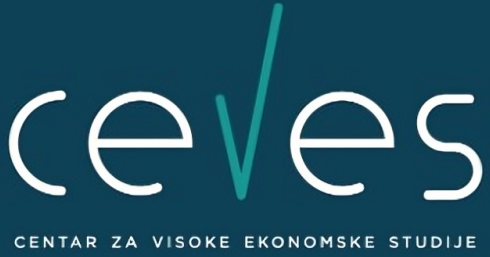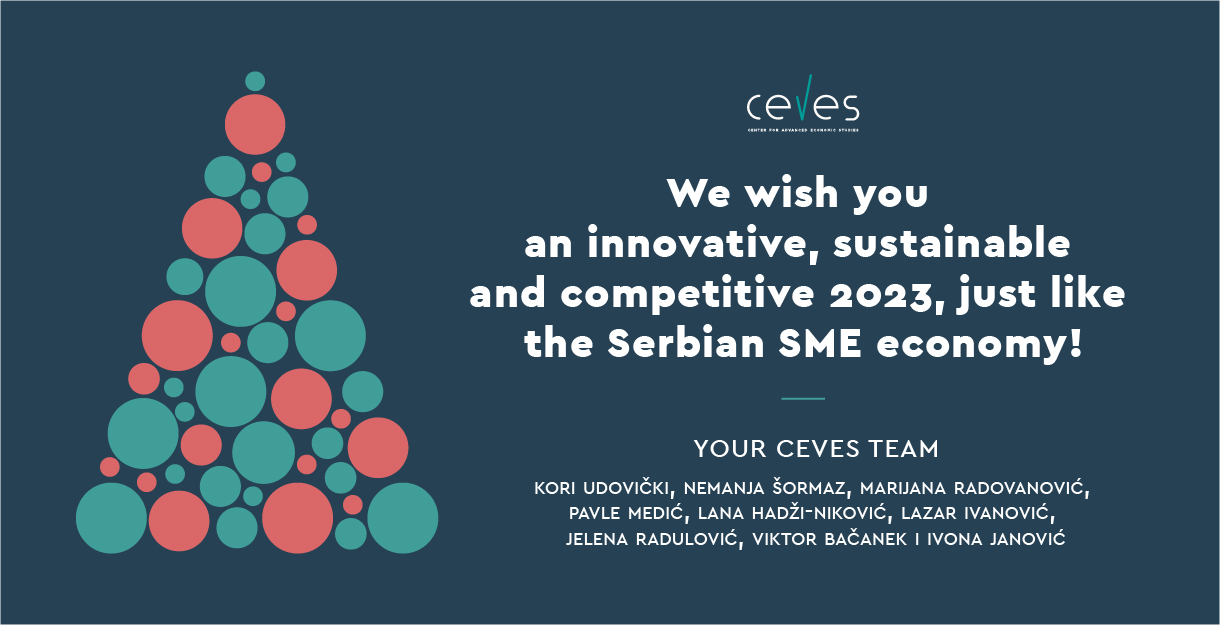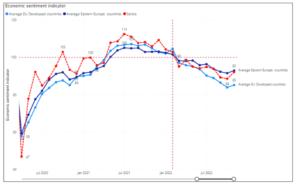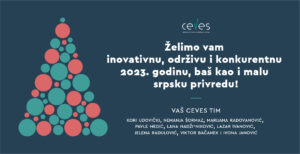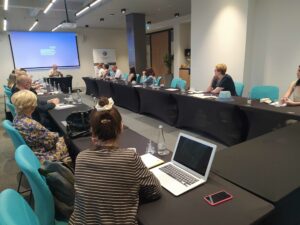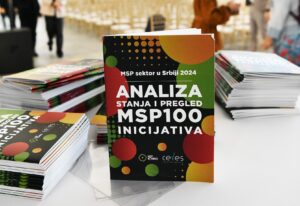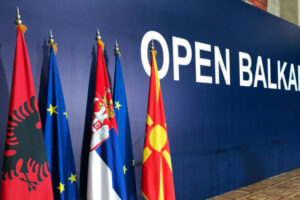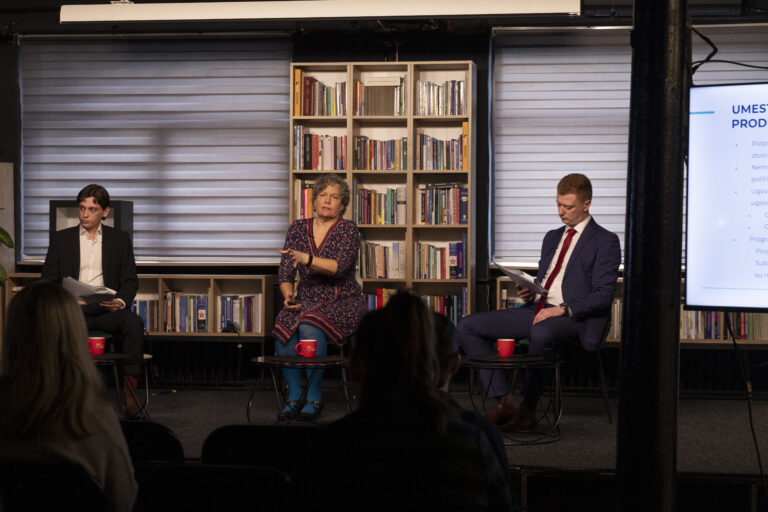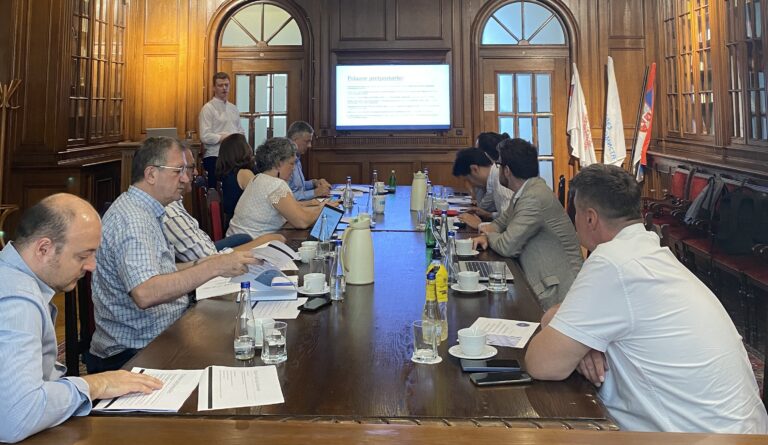Dragi naši prijatelji, partneri, saradnici, donatori,
Tokom 2022. godine zalagali smo se za ostvarivanje održivog razvoja u Srbiji, a naročito za ključnu ulogu koju mala i srednja preduzeća (MSP) moraju u takvom razvoju da igraju. Pokazali smo i da MSP imaju veliki potencijal da je odigraju — pod uslovom da ih politika i društvo podignu iz podređenog položaja. Protekla godina donela je političku neizvesnost, povećane troškove i smanjenu evropsku tražnju usled energetske krize, rata u Ukrajini, kao i sve skeptičnijeg odnosa poslovnih partnera prema međunarodnom pozicioniranju Srbije. U suočavanju sa tim izazovima, MSP pokazuju borbenost i žilavost, kao i za vreme pandemije, iako su opterećeni pritiscima i rizicima usled nedostatka vladavine prava. A možda baš zato, jer žive spremni za neprijatna iznenađenja. Manja dobra vest je da među MSP raste interesovanje za ozelenjavanje i digitalizaciju. Promovisanjem istih daćemo mali doprinos ne samo rastu njihove produktivnosti, već i življenju po evropskim vrednostima i standardima.
Naša novogodišnja odluka je da odlučno radimo na uspostavljanju stalne i stabilne podrške MSP kroz saradnju sa svim zainteresovanim stranama i da istrajemo u nastojanju da Srbija postane bolje društvo za sve njene građane. Koristimo ovu priliku da pre novogodišnjih želja, rezimiramo naš rad u 2022. godini i najavimo ključne aktivnosti koje planiramo u godini pred nama.
_____________________________________________
Povoljne okolnosti na koje smo ukazivali u prošlosti omogućile su Srbiji ubrzavanje privrednog rasta. Bila je to prilika da se rast pretvori u održivi razvoj, koja nije iskorišćena. U aktuelnoj krizi nepoštovanje principa dobrog upravljanja preti da unazadi ne samo kapacitet institucija, kao što je pokazao slučaj EPS-a, već i da unazade postignuti razvoj. Dugovi EPS-a nametnuli su značajno sužavanje fiskalnog okvira, kao i veće povećanje cena električne energije nego što bi bilo potrebno zbog same evropske krize. Uprkos tome, nastavlja se neciljano trošenje iz budžeta na široke grupe građana kojima pomoć nije potrebna, a trajno će se unazaditi položaj onih kojima je pomoć najpotrebnija. To je naročito opasno u trenutku kada je inflacija u zamahu. Takođe, na duži rok, teško je verovati u održivost ekonomske strukture koju gradimo visokim nivoom investicija o kojima se odlučuje mimo zakona, daleko od očiju i bez učešća javnosti i ekspertskih ocena.
Kao jedan od koordinatora Platforme „Održivi razvoj za sve“ učestvovali smo u oceni da za 2021. godinu na nacionalnom nivou i pored određenih pomaka, Srbija nije uznapredovala u ostvarivanju Agende 2030 održivog razvoja. Posebnu pažnju posvetili smo MSP sektoru (više u narednom odeljku) i nekim od ključnih izazova na koje nailaze: nedostajuće veštine na tržištu rada i digitalna i zelena transformacija. Na lokalnom nivou nastavili smo da radimo na jačanju kapaciteta za upravljanje sopstvenim razvojem, dok smo u tri lokalne samouprave – Pirotu, Knjaževcu i Somboru – aktivno radili na prepoznavanju razvojnih šansi i formulisanju lokalnih planova razvoja.
CEVES OPSERVATORIJA
Iako je rat u Ukrajini u februaru 2022. gurnuo poslovno raspoloženje u Evropi u negativnu teritoriju, ohrabruju indikacije da se to raspoloženje stabilizuje, a moguće i oporavlja u poslednjim mesecima, naročito u zemljama centralne i jugoistočne Evrope. U Srbiji se ekonomsko raspoloženje vidno popravlja tek u poslednjem mesecu, novembru.
Izvor: Eurostat, consumer and bussines surveys
_____________________________________________
Posebno smo ponosni na konferenciju-izložbu „MSP Srbije 2030: MSP100 Expo“, održanoj u junu 2022. godine na kojoj smo okupili i predstavili 100 vodećih MSP u Srbiji. Pokazali smo njihov potencijal i i započeli proces objedinjavanja njihovih glasova kako bi postao prodorniji. Konferencija je iznedrila niz inicijativa za dalje jačanje konkurentnosti i inovativnosti MSP sektora, a potom je CEVES nastavio da ih predstavlja u javnosti i za njih se zalaže pred donosiocima odluka.
Od 2023. godine krećemo u sistematičnu kampanju VREME JE ZA MSP! Želimo opipljive promene u položaju MSP u politikama Srbije, uklanjanje zapostavljanja ili čak diskriminacije koja trenutno postoji od strane države, a naročito: vraćanje poreskog kredita na investicije (koji velika preduzeća dobijaju a MSP ne); podizanje izvozne podrške na nivo uobičajen u konkurentskim zemljama u Evropi; usmeravanje kriterijuma podrške privlačenju SDI ka sveukupnim efektima koje one imaju na domaću privredu, a naročito u oblasti izgradnje znanja. Kampanju započinjemo krajem januara predstavljanjem MSP100 izložbe u prostorijama PKS. Pored niza medijskih aktivnosti, kampanja će uključiti i panel diskusiju na Kopaonik Biznis Forumu 7. marta – gde ćemo i predstaviti naš novi indeks konkurentnosti i inovativnosti MSP*, kao i drugu po redu konferenciju-izložbu „MSP Srbije 2030: MSP100 Expo 2023“ u septembru.
*Uz podršku USAID-a, kroz petogodišnji projekat „Velika Mala Privreda“ koji sprovodi ACDI/VOCA kojem je CEVES partner od 2022.
_____________________________________________
CEVES STAV
Od (nekada ključnog) pitanja – kada će Srbija ući u EU, sve značajnije postaje pitanje – hoće li Evropa ući u Srbiju, i kada? Srpskom rukovodstvu i javnosti još jednom ovih dana svu pažnju i energiju odvlači složena kosovska situacija koja preti da se otme kontroli, i nagriza imidž stabilnosti koji je jedan od ključnih uslova za dalji privredni oporavak zemlje. Drugi uslov je jasna evropska perspektiva, a nju ozbiljno nagrizaju kako kosovski problem, tako i neusklađenost sa ključnim stavom EU spoljne politike – odnosom prema Rusiji. Treći uslov je uspostavljanje vladavine prava i poštovanje evropskih vrednosti u upravljanju ekonomskim razvojem. Zakoni su uglavnom dobri ali se ne primenjuju ili nisu isti za sve. U tom kontekstu, usvajanje postojećeg predloga Zakona o policiji, koji ozakonjava ugrožavanje osnovnih ljudskih prava, bio bi najveći nazadak u prethodne dve decenije. A život u pravnoj sigurnosti uz učešće zainteresovanih u politikama, donelo bi radikalno unapređenje u poslovnom ambijentu, i kvalitetu javnih ulaganja i osnažilo srpsku privredu dok se suočava sa izazovima. I ne samo to. „Evropa u Srbiji“ ojačala bi evropsku perspektivu Srbije i poverenje u nju a uslov je koji isključivo zavisi od nas.
_____________________________________________
U novu godinu ulazimo sa najavama vlasničke transformacije javnih preduzeća (u akcionarska društva) a naročito EPS-a, u čijoj reorganizaciji učestvuju i norveški savetnici. No, vest koja je okupirala javnost bila je da „EPS opet izvozi struju“. Zapravo, srpski elektroenergetski sistem neće se još bar jednu godinu vratiti u puni proizvodni kapacitet, a javne finansije će otplaćivati cenu prošlogodišnje havarije još duže. Reorganizacija javnih preduzeća ne može ih proizvesti iz političkih u dobro upravljane sisteme, sve dok uspostavljanje vladavine prava ne pretvori nadležnosti na papiru u stvarne. U međuvremenu, mali napredak mogao bi se napraviti donošenjem konzistentnih energetskih i klimatskih strategija koje bi odgovorile na pitanje kako će Srbija ostvariti obaveze smanjenja emisija koje je preuzela pred svetom? I šta kad za 20-30 godina uglja ne bude više? U svakom slučaju, bilo kakvoj stvarnoj promeni moraće da prethodi ozbiljna priprema – koja će pripremiti postepeno smanjivanje zaposlenosti i alternativne izvore zapošljavanja, za masovne viškove zaposlenih koji su trenutno vezani za skoro svako javno preduzeće. Nadamo se da će i norveški savetnici to da uvide.
U narednih godinu dana uložićemo značajan napor da MSP-ove podstaknemo i pomognemo im da krenu putem ozelenjavanja svog poslovanja i svojih zajednica. Pokazaćemo im, kroz niz brošura i radionica, da ozelenjavanje poslovanja nije samo trend, ili čak pretnja, nametnuta od strane Evropske unije, već i moralna obaveza i globalni proces koji oblikuje tražnju budućnosti a koji pored troškova, otvara prilike za unapređenje produktivnosti i profitabilnosti poslovanja.
_____________________________________________
ZAHVALNICA
Velika zahvalnost našim partnerima iz projekta „Održivi razvoj za sve”, kao i GIZ-u, SDC-u, Svetskoj banci, Nacionalnom konventu o Evropskoj uniji, USAID–u, ambasadama Nemačke, Švajcarske i Slovenije i drugim donatorima i partnerima koji nas motivišu da zajedno tražimo rešenja za izazove održive budućnosti srpske ekonomije. Radujemo se daljoj saradnji!
_____________________________________________
